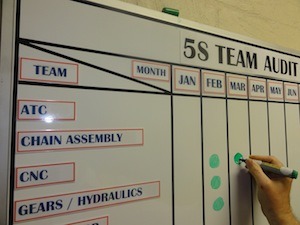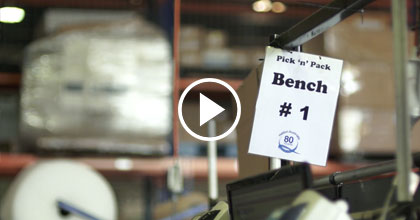We all know that audits are an important part of sustaining and improving our Lean systems and processes – various Lean Consultants have been telling us this for many years. But they are often the hardest part of implementing a new system and are easy to let slip, which results in systems that fade rather than embedded into our daily and weekly business processes. Here we will discuss the top three tips for auditing your audits and making sure your team is getting the best out of these unique opportunities to work on the business.
Top Tip #1. Do you have an Audit of Audits?

All of these individual audits need combining in one place so they can be reviewed and kept up to date. This may be as simple as a list of audits,kept in the Production manual, noting who is to conduct each audit and when will the audit be reviewed next. Then it becomes a simple process of checking, perhaps once a month, to see if all of your audits on the list were conducted by chatting to the people responsible for conducting them.
Top Tip #2. Are your Audits Auditing What Is Needed?
Once you have established that the audits are actually being conducted, the second step is to make sure they are still being done properly and finding the gaps. An audit that become a “tick in a box” exercise looses it’s value with growing your people and their understanding of their processes and their ability to improve the overall effectiveness of them.
Some of the questions to consider when reviewing audits may include:
- who participated in the audit?
- did the auditor pick up any problems?
- were any key elements missed?
- were the opportunities for improvement noted?
Top Tip #3. Is Action Being Taken as a Result of an Audit?
When we are happy that the audits are begin conducted and they are being done correctly, the last step is to make sure the findings and actions noted on the audits are being implemented – the “Adjust” part of the PDCA cycle. This can be done by taking with the teams and loping back at past audits; where were the gaps noted? What actions took place to rectify the gap?
Be wary if you keep hearing that “we advised the team member of their mistake” or “operator training” was conducted. This highlights in important lack of understanding as to how our Lean problem solving process works. If there is a repeated problem, what other fixes are needed to make it almost impossible for the operator to do the wrong thing. As an example, do like part numbers need to be separated on the shelf or removed completely when not being used? This will make it much harder for the operator to grab the wrong part or mis-read the part number labels. Constantly falling back on “the operator just needs to do the right thing” misses the opportunity to improve the robustness of that process.
In Conclusion
Auditing your audits allows you to keep an overall eye on how your teams are doing and reinforces the importance of conducting the audits. But as we have noted, conducting the audits are the fist part of building a robust Lean Production System. You must also make sure the audits are being conducted properly and results in action being taken to improve the process being audited. Auditing without action is waste.
If you need help to organise your audit auditing, give your Lean Consultant a call and we will be happy to give you a hand.
Happy Auditing!





